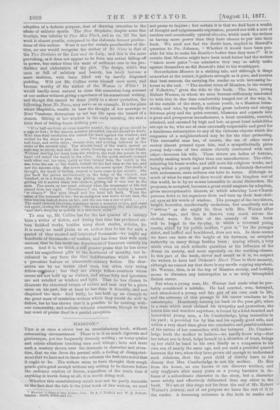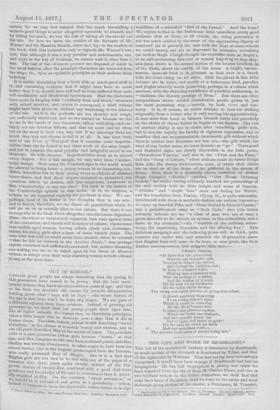MASSTON.*
THIS is at once a clever but an unsatisfactory book, without extenuating circumstances. There is in it so much vigorous and picturesque, yet too frequently slovenly writing ; so many quaint and subtle allusions touching men and things ; here and there -such a mastery shown over the dramatic in character and situa- tion, that we rise from the perusal with a feeling of disappoint- ment that we have not in these two volumes the first-rate novel that it ought to be. The writers seem to have thought their rough pearls quite good enough without any setting to be thrown before the ordinary readers of fiction, regardless of the truth that if anything is worth doing at all, it is worth doing well.
Whether this unsatisfactory result may not be partly traceable to the fact that the talc is the joint work of two writers, we need - _
Masston: a Story of flume Modern Days. By A. J. Duffield and W. II. Pollock. London. Smith, Elder, and CO, not pause to inquire ; but certain it is that we find here a wealth of thought and epigrammatic expression, poured out with a sort of careless and occasionally cynical abandon, which mark the Writers as having more power than they have chosen to put into their book. We need not feel the doubt here, implied in Boswell's question to Dr. Johnson, 64 Whether it would have been pos- sible for him to make his Ramblers better than they were ?" It is certain that Masston might have been much better had the writers "taken more pains "—an admission they may as safely make against themselves as did Boswell's Idol to his worshipper.
Nevertheless Masston is a striking tale, and although it drags somewhat at the outset, it gathers strength as it goes, and secures that best success, the carrying the reader on with increasing in- terest to the end. "The ancient town of Masston, in the county of Folkshire," gives the title to the book The hero, young Robert Warner, in whom we soon become sufficiently interested to wish him in due time comfortably hanged out of the way, is, at the outside of the story, a serious youth, in a Masston brass- works, and who, by steadily dividing great industry and energy between piety and the price-current, blossoms and expands into a great and prosperous manufacturer, a local notability, courted, admired, and caressed by high and low, as great local notabilities are apt to be, who are at once externally respectable and good for a handsome subscription to any of the virtuous objects which the magnates of a neighbourhood may be for the time promoting. This successful man has, of course, the use of other men's money almost pressed upon him, and a sympathetically pious young lady—ono of two sisters cleverly contrasted with each other—becomes his wife. These sisters are ladies of fortune, socially ranking much higher than our manufacturer. The elder, admiring his brass-works, and still more his religious works, and being withal a pretty and graceful woman, delicately-flavoured with seriousness, soon reduces our hero to terms. Although so much of what he says and does would show his kingdom not of this world, he is by no means insensible to social distinction. He proposes, is accepted, becomes a great social magnate by adoption, gives unexceptionable dinners, at which admiring Low-Church parsons defer to his sagacious dicta and turn up their best cleri- cal eyes at his words of wisdom. The younger of the two sisters, bright, beautiful, intellectually audacious, but manifestly not as " serious " as she might be, lives with Mrs. Warner after her marriage, and thus is thrown very much across the clerical ways. No little of the comedy of this book will be foiled in the by-play, in which a reverend young curate, aided by his politic mother, "goes in" for the younger sister, and baffled and bewildered, does not win. In these scenes we have our hero at the height of his fortunes, an accepted authority on many things besides brass ; among others, a very oracle even on such mathetic questions as the influence of the drama on society, and more especially on the working-classes. In this part of the book, clever and sound as it is, we suspect the writers to have had Dickens's Hard Times in their memory, although we cannot say that there is any servile copying anywhere. Mr. Warner, then, is at the top of Masston society, and nothing seems to threaten any interruption to a so truly triumphant British career.
But when a young man, Mr. Warner had made what he pro- bably considered a mistake. He had courted, won, betrayed, and abandoned a young and fair girl of his own rank in life, and the outcome of this passage in his career conducts to its catastrophe. Heartlessly turning his back on the poor girl, when in a state which most claimed his sympathy and protection, she leaves him and wanders anywhere, is found by a kind-hearted and benevolent young man, a Dr. Cumberladge, lying insensible in his yard ; is provided for by him and his equally good wife, and within a very short time gives too conclusive and painful evidence of the nature of her connection with her betrayer. Dr. Cumber- ledge leads the mother to believe—we hardly know why—that her infant son is dead, helps herself to a situation of trust, brings up her child by hand in his own family as a companion to his own son of nearly the same age, and not until a youthful quarrel between the two, when they have grown old enough to understand such relations, does the poor child of charity learn to his dismay that Mrs. Cumberladge is not his mother. He flies from the house, no one knows or can discover whither, and only reafipears after many years as a young barrister in de- fence of a subordinate character in the story, but a character more subtly and effectively delineated than any other in the book. We are at this stage not far from the end of Mr. Robert Warner's journey, and of set purpose we leave the rest of it to the reader. A becoming reticence is due both to reader and author, for we may feel assured that too much forestalling a writer's good things is never altogether agreeable to himself, and by telling too much, we run the risk of taking all the savour out the tale. So here we leave the residue of the fortunes of Mr. Warmer and his Masston friends, cleric and lay, to the readers of the book, with this intimation only as regards Mr. Warner's own end, that although it was a very peculiar and melodramatic one, and quite in the way of business, we cannot wish it other than it was. The rest of the dramatis persons are disposed of much in the usual fashion, after the principal characters are removed from the stage, viz., upon as equitable principles as their authors think befitting.
It is rather tantalising that a book with so much good stuff in it, and containing evidence that it might have been so much better than it is, should have suffered as it has suffered from mere self-confidence and intellectual insouciance. Had the characters been more in keeping with "ordinary flesh and blood," creatures with mixed motives, and action to correspond, a third volume might have been given us, without any weakening of the interest of the tale. As it is, the portraits are too sketchy and rough, not sufficiently shadowed, and we are carried on because we feel we are in the hands of two humorous, rather rollicking, and cer- tainly not too reverent fellows, and that we must just let them tell us the story in their own way, lest if we interrupt them too much they may not choose to tell it at all. It has been truly said of the Vicar of lila/afield that it contains more improba- bilities than can be found in any other work of the same length, and yet it remains the most popular and delightful novel in our language. So with Masston. Improbabilities cross us in almost every chapter. For a fair sample, we may take these Cumber- ledge doings, How many Dr. Cumberladges in the world would be allowed to bring home a young woman in an interesting con- dition, introduce her to their young wives as objects of abstract benevolence, and find these objects accepted es presented, few questions asked, no doubts, still less suspicions, awakened in Mrs. Cumberladge, or any one else ? Yet such is the fashion of the Cumberladge episode in this novel. It is, we suppose, a tribute to the supposed capacity for goodness in man. We are, perhaps, most of us, better in our thoughts than in our acts ; -and in fiction, therefore, we can digest all possibilities which do not jar on us as actually alien to our nature. But there is one incongruity in the book which altogether exceeds human digestion. Time, elsewhere so consistently impartial, hero runs against some of the characters, and stands still in favour of others ;, ripens some into middle-aged women, leaving others (their own contempo- raries) blooming girls after a lapse of some twenty years. The man who was told Ile could never have dreamt, when he avowed " that he felt no interest in the Arabian Nights," was perhaps rightly corrected and sufficiently answered ; but, neither dreaming nor waking, are we to be called upon by our brace of Masston writers to accept even their most charming women as both old and young at the same time.































 Previous page
Previous page